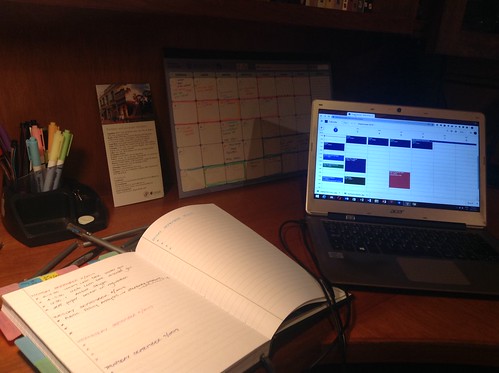“The key is to not to prioritize what’s on your schedule, but to schedule your priorities.”
― Stephen R. Covey
I can’t recall who I heard it from before, but I clearly remember someone (a senior professor, most likely) recommending that I should “pay myself first” by prioritizing my own writing over anything else I have on the docket. This was particularly important as I got my first tenure-track job. While being able to prioritize tasks is important across all career stages, for early-career-scholars it’s even more important, I think. I’ve written quite often on my blog about Organization and Time Management and also on task prioritization (blog posts associated with the latter can be found on my Planning Strategies page).
I first learned about the whole notion of scheduling writing blocks from Dr. Tanya Golash Boza, whose blog was an inspiration for mine. When I was early in my academic career, I really tried to develop a weekly template that would enable me to schedule my life to the very minute. This didn’t work well after a few years, to be perfectly honest.
I have written previously about the importance of building flexibility in your calendar and making sure that you schedule enough time to get your tasks done, but I think it’s just as important to learn how to prioritize, and to be perfectly honest, I understand that prioritizing tasks is a juggling game between what others expect from us and what we need to get done in order to further our careers.
Don’t get me wrong: I am the first one to suggest that service work is very important, even for junior scholars and graduate students. Academia is, for better or worse, a guild founded on the notion of reciprocity, cooperation and collaboration. I review this manuscript for your journal or your press in hopes that other people will review my own manuscripts when I submit them. So this delicate balancing act between being generous and reciprocal and prioritizing yourself and your own work is hard.
As you can see above, I pay myself first by scheduling my writing time BEFORE my teaching. That way, once I enter the classroom, I’ve already spent my writing time focused on my own priorities (my writing commitments, particularly).
I have suggested one strategy to deal with this: the TOTOs vs. TOMs prioritization strategy. TOTOS are Texts the I Owe To Others. TOMs are Texts that I Owe Myself. In this particular post I suggest that as much as possible, and with no detriment to others, you prioritize your TOMs first and work on those at the top of your energy levels and THEN focus on your TOTOs.
This TOTOs vs. TOMs delicate balancing act can be performed every day. For example, I prioritize my own writing every morning. The first two hours of the day are for MY own manuscripts (my TOMs). Work on drafting papers I need to finish writing and submitting, reading material that will forward my own work. Later during the day I do work on the texts that I owe others (TOTOs).
My suggestion is therefore that when you plan your weekly schedule, budget your time, and develop your To-Do List, consider the TOMs vs. TOTOs strategy and pay yourself first by blocking time to focus on your own work. This doesn’t mean that you won’t get to the things you are supposed to be doing for others, but that you put yourself at the top of the priorities list.



0 Responses
Stay in touch with the conversation, subscribe to the RSS feed for comments on this post.